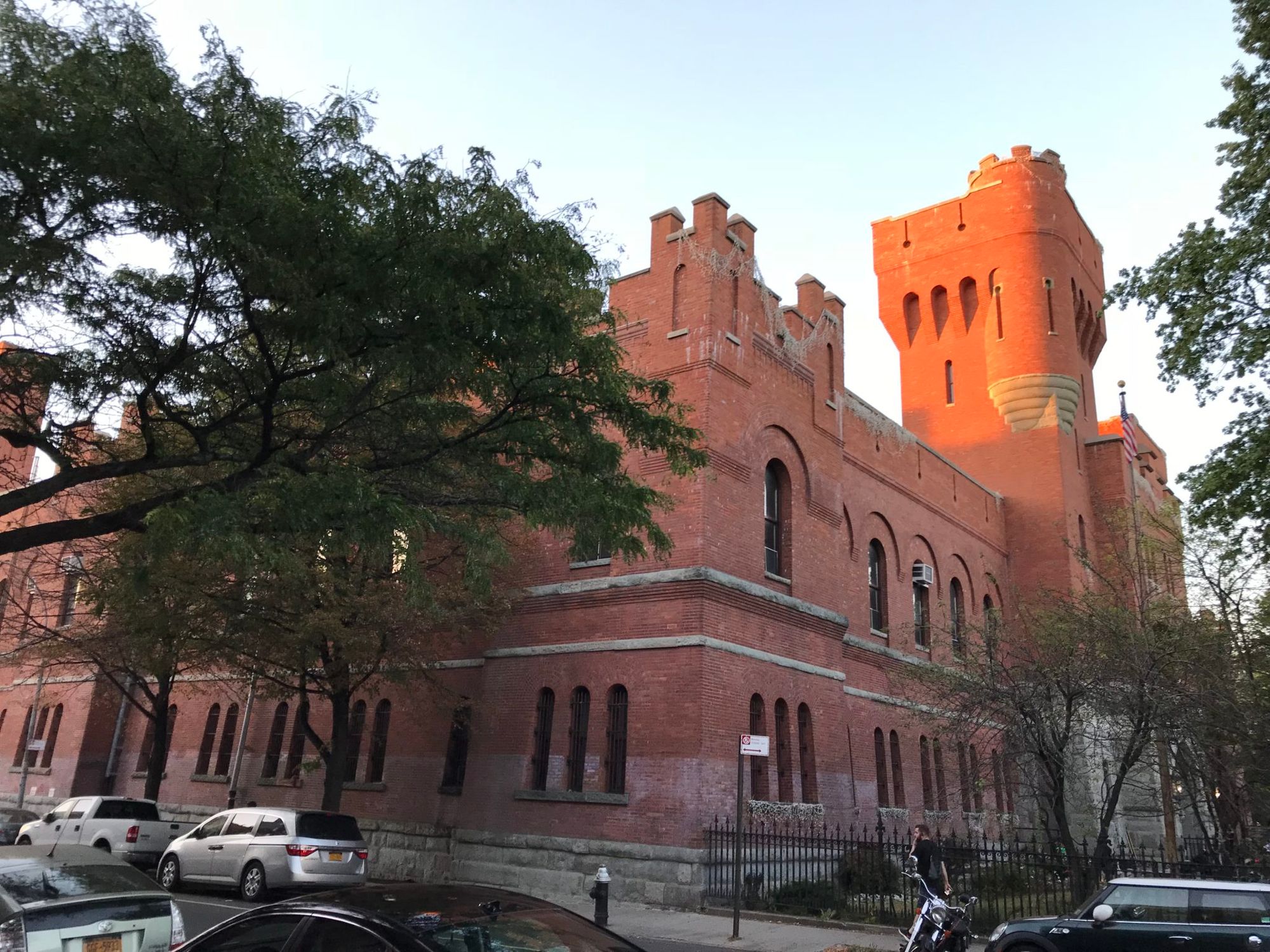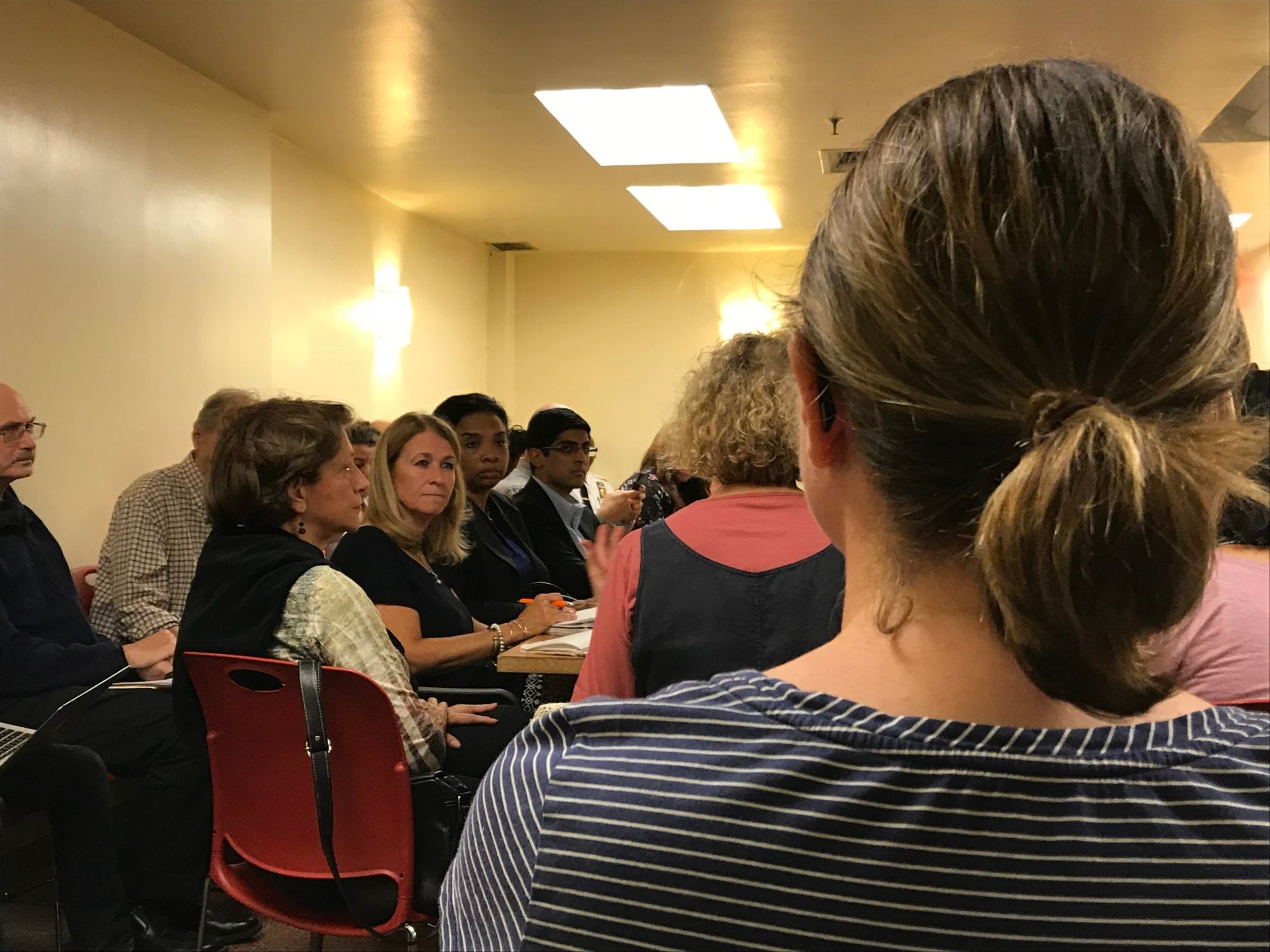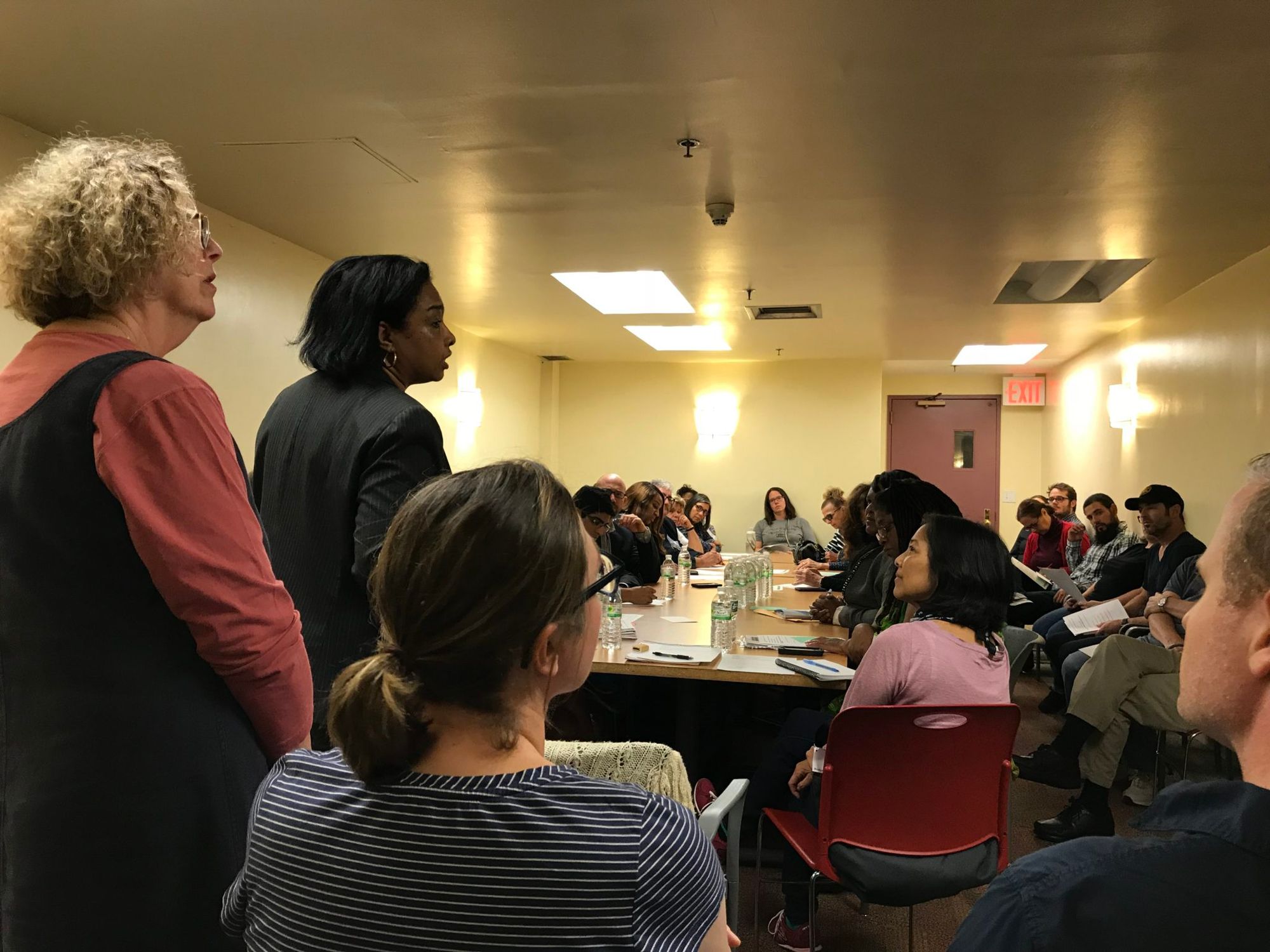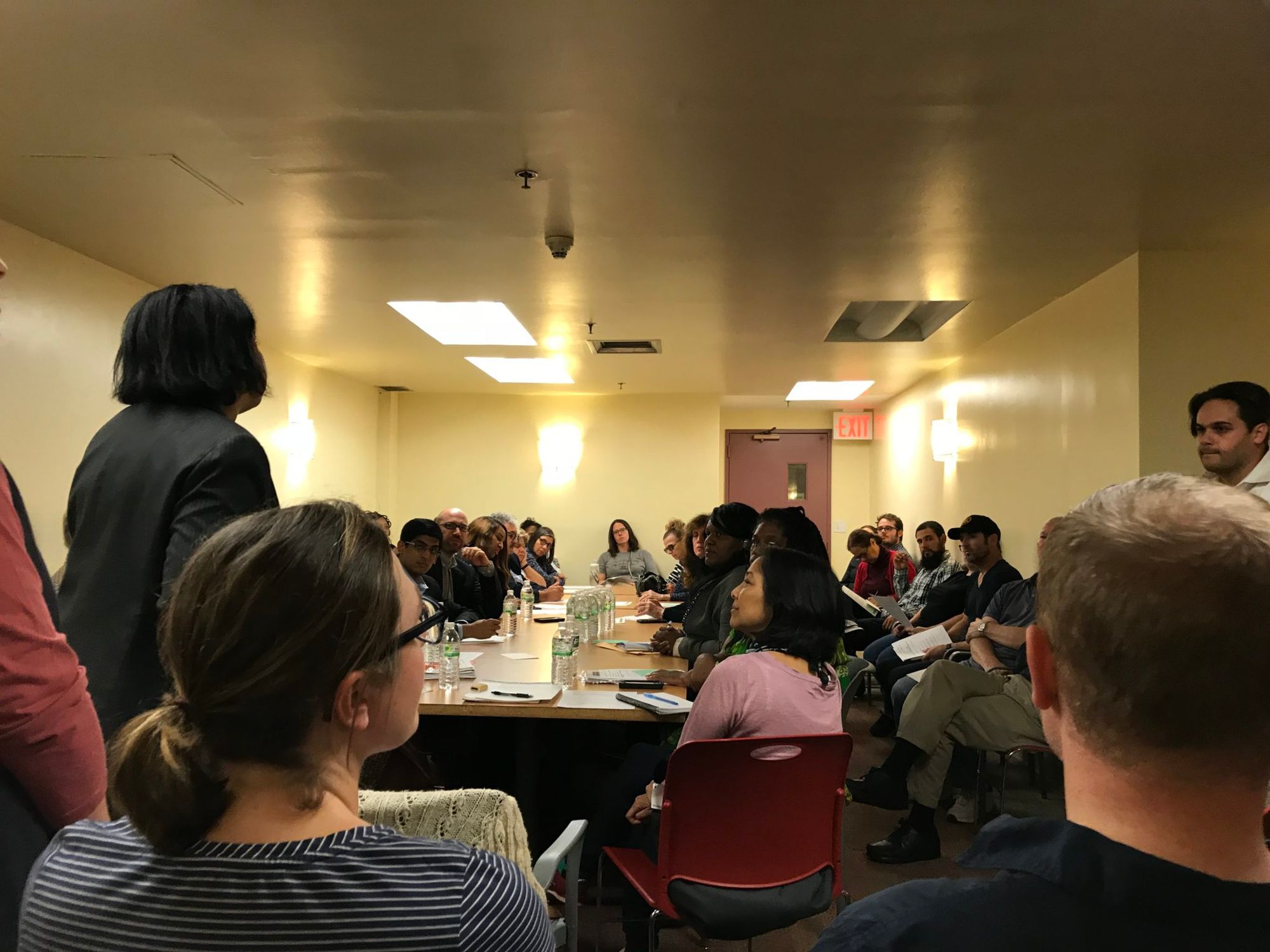Neighbors Organize Meeting To Discuss Concerns Regarding CAMBA Shelter Residents In Park Slope


PARK SLOPE – “This is not a meeting about eliminating the shelter,” Barbara Barran said at the start of a meeting Wednesday night addressing recent problems with some of the residents at the CAMBA-operated women’s shelter located at 1402 8th Avenue (between 14th & 15th Streets) in South Slope.
Barran, Laura Ide, and Nelly Isaacson, long-time residents of 16th Street and neighbors of the Armory building which houses the shelter, organized last night’s meeting held at the Bishop Boardman Apartments. The basement room was packed with concerned neighbors as well as representatives from CAMBA, the Department of Homeless Services (DHS), and the 72nd and 78th NYPD Precincts. Assembly Member Robert Carroll and Council Member Brad Lander were also in attendance.
Barran noted that the shelter, which CAMBA took over from DHS in 1996, has always been a good neighbor but that incidents of shelter residents aggressively panhandling, harassing residents and business owners, shoplifting, urinating on the streets and in the subway stations, and sitting on stoops and smoking marijuana have suddenly started to occur within the past several months. She and her neighbors want to know what has changed at the shelter that is causing these recurring problems in their community.

The Senior Vice President of CAMBA, Claire Harding-Keefe, outlined the services her organization offers, which includes providing temporary housing, meals, 24/7 security, and on-site medical and psychiatric services to 100 women. The shelter enables women to stabilize their conditions and move toward permanent and/or supportive housing.
Four years ago, the shelter increased the number of beds it offers from 70 to 100, which several residents said were too many, suggesting the higher number of shelter residents might be contributing to the spate of recent complaints. “The more [shelter residents] you have in there, the harder it is for you to handle,” one impassioned neighbor declared.
Valerie Barton-Richardson, Executive Vice President of CAMBA, said she did not see the increase of beds as a factor, noting that the increase happened four years ago and that the complaints being discussed have been more recent. She also pointed out that the shelter’s social services and security staffs also increased at that time to accommodate the additional residents.

Harding-Keefe told the group that DHS recently provided four officers and a sergeant to add to the shelter’s security team and said that shelter staff patrols the surrounding streets every 15 minutes (recently increased from every 30 minutes). The blocks regularly patrolled include 14th and 15th Streets between 7th and 8th Avenues. The 16th Street block between 8th Avenue and Prospect Park West has recently been added in response to concerns.
She insisted that residents save the shelter’s phone number (718.369.7226) on their cellphones and immediately call the shelter whenever they witness “inappropriate” behavior from someone they believe to be a shelter resident, saying “what is most important to us is real time information” so that they can send guards to respond and confirm that the offenders are CAMBA clients and address the situation.
Brad Lander, who initiated a meeting with Brooklyn Community Board 6 in June to discuss Mayor de Blasio’s “Turning the Tide on Homelessness in New York City” initiative, vouched for CAMBA saying that the organization is consistently attentive and responsive to community concerns. Both Barton-Richardson and Harding-Keefe were invited to the June meeting to talk about CAMBA’s Good Neighbor Policy.
“We believe in being a good neighbor,” Barton-Richardson said at the earlier meeting. “That means having community advisory board meetings so folks can get information about shelter operations on a regular basis.” She added if neighbors have issues or concerns—”Let’s talk about them. Let’s communicate. That dialogue, that ongoing partnership, is important in a shelter.”
“We are good neighbors. It is important to us to listen to our neighbors,” Barton-Richardson reiterated Wednesday night. “We see this as an opportunity to hear your concerns but we also see this as an opportunity for us to provide you with some information about the shelter, and have a dialogue.” She urged those at the meeting who “would like to continue this conversation” to attend the shelter’s monthly community advisory board meetings. The Armory Shelter hosts these meetings the third Tuesday of every month.
Officer Dan McGrath, the 72nd Precinct NCO for the area, urged residents to be the “eyes and ears” of the neighborhood and to contact him or his partner, Officer Francis Ghanney, if they suspect illegal activity going on or if they feel patrols need to be beefed up in certain areas. He ended by assuring the group that his team would increase patrols in the neighborhood.
Assembly Member Robert Carroll noted that he worked with Officer McGrath and his precinct over the summer to resolve “issues not all that different from the issues we’re talking about right now” in South Slope and Windsor Terrace, and were able to fix the situations in a “practical and humane way.”
“I know that if you are in contact with Officer McGrath, and you go to those community council meetings, that we can get real things accomplished,” Carroll said.
Living near the Armory shelter himself, Carroll said that he’s experienced some of the issues being discussed firsthand. “I totally understand how scary the situation is…I walk up 16th Street all the time. I walk down 8th Avenue all the time,” he said.
“I understand how intimidating it can be if somebody is on your stoop and they’re smoking marijuana or they’re just hanging out. That can be extremely disconcerting,” he added. “I’ve definitely been approached at times by people who are aggressively panhandling and that’s completely intimidating and that’s unacceptable but we need to make sure that we are adults and that we are reaching out to the folks who are going to help us to alleviate this situation.”
“I’m convinced that if we work with CAMBA, if we work with the 72nd and 78th Precincts that we’ll be able to do this,” Carroll stated. (Since the southern side of the Armory is situated on 15th Street, the building straddles the border of the two police precincts as well as Community Boards 6 and 7.)

In response to the question, “what has changed to create these issues?” Aqueelah Winston, a DHS representative, said “As a system, there is a prevalence of mental illness, there is an opioid epidemic throughout New York City and throughout the United States. A lot of the clients in our system suffer from mental illness and they have histories of trauma.”
“I understand that there may be security concerns and it’s difficult to deal with vagrancy in your neighborhood,” she continued. “We want to be good neighbors and I know it’s disconcerting when you have to encounter these issues, but it’s really important to understand that when you see these individuals engaging in that type of behavior that they are in crisis. They are suffering from mental illness and a lot of times they do not have insight into their mental illness and they don’t understand their behavior.”
Winston notes that the women have been placed in the Armory Shelter because “they have a diagnosed need.” She added, “They suffer from mental illness and a lot of times the behaviors that they’re exhibiting are a symptom of their mental illness. As much as we’d like to be able to have them follow our treatment plans and follow our schedules to a T, they are humans and we are bound by Federal and State regulations that require us to allow them to come and go.”
“They are not incarcerated,” Winston continued. “We do not operate prisons, we operate shelters. There is a constant challenge trying to get them to engage in the services, and a lot of it takes time.”
“We want you all to understand that these are individuals in crisis. They are suffering from trauma. They are suffering from addiction. And it’s not something that we can fix overnight,” she added.
She emphasized the importance of the community’s contacting the shelter and the NYPD when they witness criminal or inappropriate behavior. “I think the most important thing is that we have to know about these issues. There’s no such thing as too many complaints. If you’re calling 311, if you’re in contact with the shelter, if you’re in contact with your NCOs, if you’re in contact with your community district officers, we will get that information and we can follow up,” she explained.
She noted that illegal activity should be reported to the NYPD, but that neighbors should report non-criminal but troublesome activity to CAMBA or DHS. “These are the things we need to know because we will engage with the client about those actions. We have to be able to talk and have a dialogue with the client, but we can’t do that if we don’t know what’s happening. So please call 311, contact the shelter, contact NYPD, and start making these concerns known so we can help you. We have to be proactive, so as things happen, you have to report them,” she said.
At the end of the meeting, Barran summarized the next steps to be taken by the community:
- Call CAMBA immediately when you witness questionable activity by shelter residents (718.369.7226)
- Call the NYPD NCOs (click on the links for telephone numbers) – 72nd Precinct, 78th Precinct, to report incidents or concerns
- Attend CAMBA’s monthly community advisory board meetings (these typically take place on the third Tuesday of the month)
- Attend the monthly CB6 (next General Board Meeting is Wednesday, October 11) and CB7 community board meetings and community council meetings. The 72nd Precinct’s Community Council meetings typically take place on the second Tuesday of each month at 7:30pm in the precinct. The 78th Precinct’s Community Council meetings typically take place on the last Tuesday of each month at 7:30pm in the precinct (note: October’s meeting will take place on October 24 – call the precinct to confirm.)
- Contact Assembly Member Robert Carroll‘s and Council Member Brad Lander‘s offices with concerns
On Thursday, Barran said she was pleased with the meeting overall and was grateful to all the neighbors, elected officials, members of the NYPD, and representatives from the NYC government agencies who showed up. “We want people to listen to what we have to say, and to take steps to implement change. By coming, these representatives showed their concern, and so I’m confident that they will take action.” She added, “I’m confident that CAMBA will make every effort to get things back on track.”
She noted that the large turnout last night demonstrates “the seriousness of the issue,” adding, “People don’t show up at these sorts of meetings unless they feel strongly about an issue.”
“There has been a change in the neighborhood dynamics between the shelter residents and the permanent residents of the neighborhood,” Barran continued. “I want to stress that the neighborhood residents understand that the shelter needs to continue its work. By no means are we asking for the shelter to be closed or moved. We just want to return to a calmer, more peaceful environment.”




